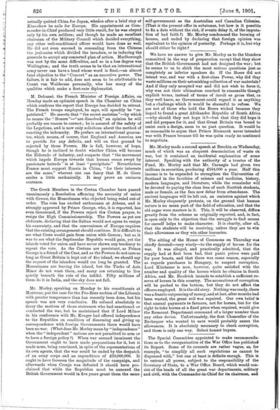Mr. Morley, speaking on Monday to his constituents at Montrose,
put the case for the Pro-Boer section of the Liberals with greater temperance than has recently been done, but his speech was not very conclusive. He refused absolutely to decry the motives of those statesmen who had sanctioned or conducted the war, but he maintained that if Lord Milner in his conference with Mr. Kruger had offered independence to the Republics on condition of disarming and giving up correspondence with foreign Governments there would have been no war. (What does Mr. Morley mean by " independence " when the " independent " nations are not permitted to arm or to have a foreign policy ?) When war seemed imminent the Government ought to have made preparations for it, but it made none, being convinced, in spite of the representations of its own agents, that the war could be ended by the despatch of an army corps and an expenditure of £10,000,000. It ought to have foreseen the magnitude of the campaign, and afterwards when Cronje was defeated it should have pro- claimed that while the Republics must be annexed the British Government would in five years grant them the same self-government as the Australian and Canadian Colonies. (That is the present offer in substance, but how is it possible to fix a date without the risk, if events delay it, of the imputa- tion of bad faith ?) Mr. Morley condemned the burning of houses, and ended by declaring that foreign opinion was equivalent to the opinion of posterity. Perhaps it is, but why should either be right?






































 Previous page
Previous page